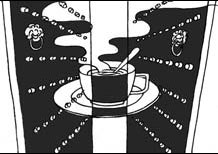Netizens distracted by 'small evil'
By Raymond Zhou (China Daily)Updated: 2007-01-20 08:13
 Yang Zaibao was a screen icon of heroism and virility in the
early 1980s. His image was used to hawk some male enhancement products without
his approval. When he sued the offending company, the media condemned it for
damaging Yang's good name, but hardly anyone mentioned the illegal use of
copyrighted material.
Yang Zaibao was a screen icon of heroism and virility in the
early 1980s. His image was used to hawk some male enhancement products without
his approval. When he sued the offending company, the media condemned it for
damaging Yang's good name, but hardly anyone mentioned the illegal use of
copyrighted material.
In the eyes of the public, the culprit was the less than honorable nature of
the advertisement. By extension, if it had been a sound product such as a
calendar, people would probably not have raised an eyebrow. 
Fast-forward 25 years. Half a million Chinese netizens are fuming over the presence of Starbucks in the Forbidden City. They are protesting the cultural clash while they should detest the rampant commercialism.
It is quite common for those with strong emotions to develop tunnel vision and overlook the big picture. The critical factor in both of the above cases is legality. The law has clearly stipulated that commercializing a person's image without their consent is illegal, and which advertiser did the plagiarizing was irrelevant. Likewise, if laws and regulations permit restaurateurs to operate in the former imperial palace, then the Seattle-headquartered coffee shop did nothing wrong.
If citizens feel this is a big mistake, they should push to revise the law in the first place.
As a matter of fact, much of the disapproval is targeted at a very subjective realm of ethics and aesthetics. The product for which Yang's photo was plastered around is probably no longer considered ignominious. As for the coffee outlet, it is just as murky as to what is right or wrong.
Personally, I think the Starbucks shop blends in quite well with the environment. If it had been a giant golden arch, I would have strongly objected.
I guess it is the foreignness of the vendor that critics are pointing fingers at. In that case, they should propose to forbid all foreign retailers from, say, world heritage sites. But then, what if some Chinese company bought a majority stake in Starbucks? Would that make it more palatable for a quintessentially Chinese locale as the Forbidden City? In the age of globalization, this scenario is not implausible.
OK, if it's not the ownership that's worrying them, we can shift to the cultural aspect. In many historic downtowns of European and American cities, there are Chinese restaurants. Do they mar the integrity of the sites? On the contrary, local tourism brochures tout them as a display of multicultural color.
I surmise it is the purity of the site that people want to safeguard. But purity is relative. When we look at a historic building, it usually boasts additions and reconstructions that reflect later eras. Yes, some of the changes are deplorable, but others are accepted. Likewise, a Starbucks in the old palace could be construed as an interesting fusion of old and new and a sign of progress as well as an intrusion.
Of course, public opinion should be taken seriously. The opening of the outlet should have been preceded by consultation with heritage protection experts and, if necessary, by public hearings. More importantly, rampant commercialization must be curtailed in such locations, which is far more urgent than moving out one Starbucks store.
If you travel around the country, you'll see lots of structures that are literally blots on the landscape. The builders often have connections with local officials. And it is money and power, without the restraints of rules, public opinion or aesthetic considerations, that drive such projects.
The online horde is well intentioned but misguided. They are trying to root out one small evil at least what they consider to be evil while leaving out the real evil.
raymondzhou@chinadaily.com.cn
(China Daily 01/20/2007 page4)
|
|
|
|